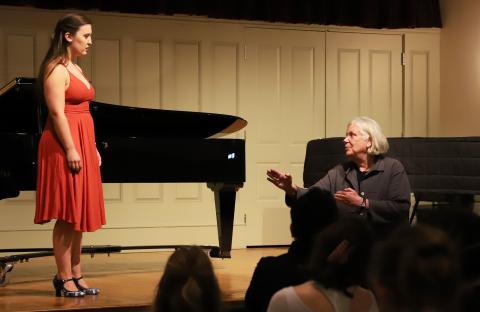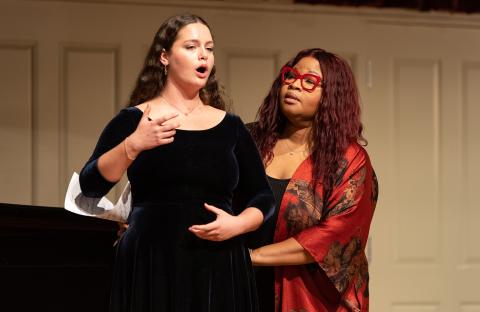Connecting Students with Industry Greats

Acclaimed director Anne Bogart (right) provides feedback to soprano Sarah DeYong (left) during a Viewpoints master class.
Soprano Sarah DeYong (M.F.A. '23, vocal pedagogy) was midway through her master class performance with Anne Bogart when the acclaimed director asked her to pause for a moment and reevaluate. DeYong was performing “Your Texas” from the musical Giant, and Bogart—who happens to be the world’s leading practitioner of the dramatic technique known as Viewpoints—had some advice to put DeYong at ease.
“To be really over-simplistic, there’s two kinds of performers, one that goes out to the audience, and one that brings the audience to them,” Bogart said. “See if you can bring us to you.”
So, DeYong began the song again with a more grounded approach, settling into her body and the character it was playing, without straining to reach the audience. The adjustment not only made her dramatic gestures feel more authentic, it improved her vocal delivery as well.
From her seat in the front row, Bogart watched the transformation with the eye of a seasoned director, but also with sincere encouragement.
“It was really amazing because when I breathed, she breathed with me,” DeYong said. “I could tell that—all the way from her sitting in the front row, up to the stage. It was a level of support that’s kind of unparalleled.”
Master classes like Bogart’s offer Conservatory students first-hand access to performing artists and educators working at the very heights of the profession, and are an invaluable component of students’ development. Feedback received in a master class raises the bar both artistically and professionally, bringing new insight to students’ daily practice and reshaping their approach to performance.
Bogart cofounded the SITI Company and coauthored the highly influential Viewpoints Book, an approach to performance that explores principles of movement over time and space. Viewpoints training has become integral to performing arts curricula all over the world, including the Conservatory’s.
It was really amazing because when I breathed, she breathed with me... It was a level of support that’s kind of unparalleled.
—Sarah DeYong
Christopher Humbert (M.M. '23, opera) said he was “absolutely thrilled” to attend Bogart’s master class and speak with her during the question-and-answer session. Her advice regarding character development will stick with him well into the future, he said.
“Seeing her in action with each of the students made me realize how important it is to get out of your own way within a performance,” Humbert said. “Once the preparation of a role has been completed, the evaluating must end. Letting the character live and breathe in a manner that is bigger than what we can evaluate in real time is pivotal.”
Later this month, Humbert will have the opportunity to perform during a master class with pianist and conductor Martin Katz, whom the New York Times has called “the gold standard of accompanists.” Katz and Bogart are just two of many visiting artists hosted by the Conservatory’s Voice/Opera Department over the 2022–2023 academic year.

Metropolitan Opera soprano Karen Slack (right) guides student Jamila Drecker-Waxman (left) through her master class performance.
The department also welcomed Metropolitan Opera soprano Karen Slack; vocal acoustics pedagogue and tenor Kenneth Bozeman (author of Practical Vocal Acoustics); and two-time Grammy nominee Stephen Powell, a baritone who has performed with the New York City and Metropolitan Operas.
Read on to hear from Boston Conservatory voice students in their own words, as they share what they learned from their master class experiences.
Tyler Cesario (M.M. '24, vocal pedagogy) on working with vocal acoustics expert Kenneth Bozeman:
“[Bozeman] works a lot with the science of acoustics and how that informs voice teaching. I study voice pedagogy, so it was kind of perfect for me. And it was new for me, learning how vowel modification works in practice—literally with my own voice. For instance, we were talking about e vowel, how you should keep your tongue in the same position but open your mouth more, and it was like night and day difference."
“Master classes are really important for students, to be able to work with another big name that’s not part of your school. I mean, we have big names at our school, but that variety is so valuable. Differentiated instruction is important. Bozeman was, essentially, saying very similar things that my voice teacher says, but in a very different way. And sometimes you just need a different set of words.”
Joel Clemens (M.M. '22, P.S.C. '23, opera performance) on working with Grammy-nominated baritone Stephen Powell:
“[Powell’s] main point for me was that the vocal affect and the dramatic affect go hand in hand. He really helped me open up my sound and create a lot of depth, which left a lot more room to play around with the colors and with different tone qualities that heightened the storytelling. He had me making much bigger sounds than I thought I could, with what’s a pretty gentle song. That made it possible to pare down, rather than starting from an already smaller place and not having as much room."
“The format of the master class in general is really valuable because you’re able to see the clinician work with a couple different students. You have a little bit of added pressure of your peers watching you, but it is a much more realistic sense of how you can make a piece more effective in an actual performance.”
Jamila Drecker-Waxman (P.S.C. '23, opera) on working with Metropolitan Opera soprano Karen Slack:
“With each run of my piece, she helped me come out of my shell and bring something new to the table. While it was challenging to try and juggle so many new things all at once, I’m so grateful for the lessons she taught me: how to give a moving performance, improve my technique, and sing from the heart."
“Ms. Slack used specific technical advice to better my singing, but also to better the storytelling and emotional connection to the piece. With the specific repertoire I was working on (Mimí in La bohème), she helped reinforce just how much the emotional content impacted the physical singing.”
Learn more about Boston Conservatory's leading voice and opera programs.
